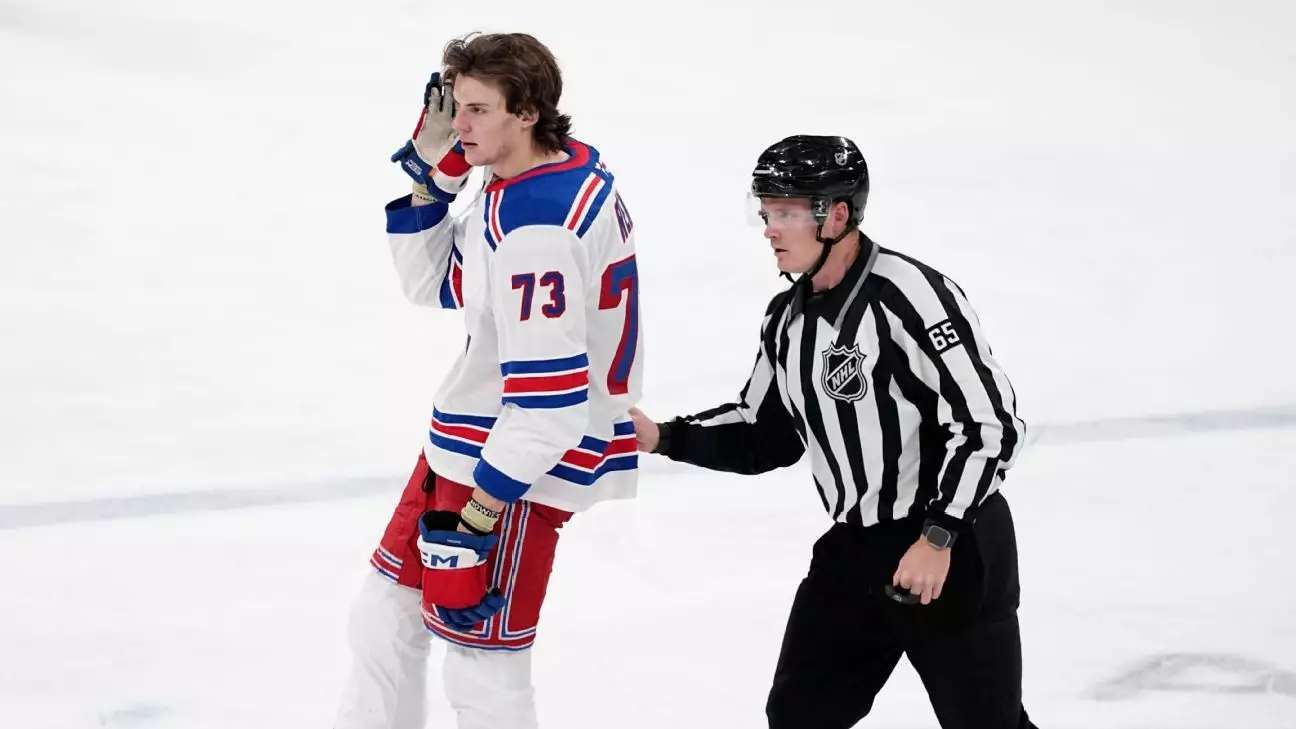The National Hockey League (NHL) is no stranger to controversy, especially when it comes to player safety and discipline. The recent suspension of New York Rangers forward Matt Rempe for eight games is a glaring example of the league’s strict stance on reckless behavior on the ice. Following a hit on Dallas Stars defenseman Miro Heiskanen that breached multiple NHL regulations, Rempe’s actions have sparked a broader discussion about the balance between physical play and player safety.
On a seemingly routine play during a recent game against the Dallas Stars, Rempe delivered a hit that would ultimately lead to his extended suspension. As Heiskanen attempted to play the puck, Rempe skated in from behind, raising his arm and forcefully driving Heiskanen’s head into the glass. The immediate aftermath of this reckless play saw Heiskanen fall to the ice, and both teams engage in a skirmish. Such incidents not only compromise the safety of the players involved but also highlight the emotional volatility that can arise during high-stakes games.
The NHL’s Department of Player Safety classified Rempe’s actions as violations of both the boarding and elbowing rules. The severity of the hit raised concerns about the responsibilities players have on the ice, especially when considering the health risks associated with high-impact collisions. Evaluating Rempe’s awareness—or lack thereof—before making the hit reveals a disturbing aspect of his approach to physicality in the game.
Rempe’s case is particularly notable due to his status as a repeat offender under the collective bargaining agreement. He had previously faced a four-game suspension for elbowing New Jersey Devils defenseman Jonas Siegenthaler. This history of infractions means that Rempe is subject to harsher penalties for subsequent violations, indicating a zero-tolerance policy for reckless play. The NHL’s ruling not only aims to discipline Rempe but also to serve as a deterrent for other players who may be tempted to engage in similar dangerous behaviors.
Financially, the repercussions are significant for Rempe, who will forfeit $80,000 from his average annual salary, with the funds directed to the Players’ Emergency Assistance Fund. This is a sobering reminder that on-ice conduct can have real-world financial implications, affecting players and their families.
Rempe has the right to appeal his suspension to NHL Commissioner Gary Bettman and, given that it exceeds six games, he can also seek a review from a neutral arbitrator. This dual-layer of appeal reflects the complexities surrounding player discipline in the NHL, allowing for a degree of due process while also reinforcing the league’s commitment to enforcing safety protocols. However, the burden lies on Rempe to demonstrate that his actions were within the rules, a challenging position given the nature of his offense.
Despite the controversy surrounding Rempe’s actions, Rangers coach Peter Laviolette expressed a mix of appreciation for Rempe’s impact on the game and dismay at the penalty incurred from his hit. Laviolette acknowledged that Rempe was making a significant contribution to the game and galvanizing his teammates before the incident occurred. This raises questions about the balance between allowing players to showcase their physical skills and the risk of detrimental consequences.
As the NHL moves forward, this incident will likely reverberate through both player training regimens and league disciplinary policies. Players must adapt to a rapidly evolving understanding of safety standards in sports—an understanding that prioritizes the health and well-being of individuals over the traditional glorification of hard hits and intimidation.
Matt Rempe’s suspension serves as a stark reminder of the delicate balance professional athletes must navigate in high-contact sports like hockey. While physicality can add excitement and intensity to the game, it should never come at the cost of a player’s safety. The NHL’s stringent enforcement of rules against reckless behavior signals a commitment to championing player welfare. Moving forward, players like Rempe must reflect on their choices and adopt a safer approach if they wish to remain active contributors to their teams and the sport.


Leave a Reply